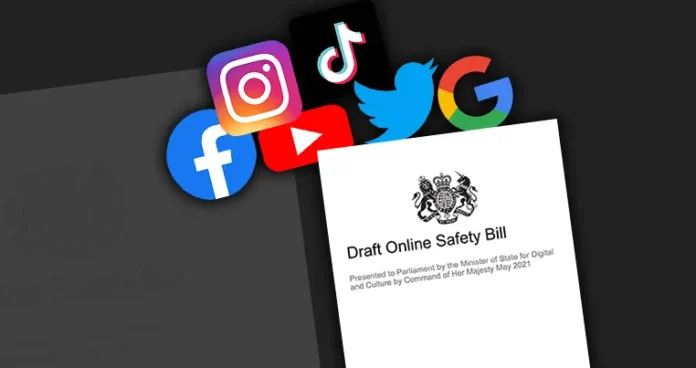A joint committee of British lawmakers has prepared a report on the draft of the UK online safety bill, which seeks to regulate tech giants. The report suggested that the bill had too many loopholes for the “Wild West” on social media. It added new criminal offences to strengthen legal obligations on the industry further.
The first draft was published in May 2021 that asked tech giants to protect kids by tackling harmful content on their platform. However, the effort has largely failed as the industry runs on self-regulation.
The latest proposal for amendments to the bill addresses many issues affecting social media users.
UK government will have 2 months to respond to this report. Then it will reach Parliament and become the law.
The Scope of UK Online Safety Bill
The committee’s report is under debate regarding what it added and missed. The report said that what’s illegal offline must be illegal online too. For far too long, tech giants have been getting away with being the “land of the lawless”.
A lack of regulation on social network sites has caused too many people to face fraud, abuse, violence and even suicide. Moreover, it is said to hold the “negligent” tech bosses personally accountable for the failures in complying with UK online safety bill. The websites of concern include Google, YouTube, Facebook, Twitter, TikTok, and Instagram.
The report suggested giving power to regulator Ofcom to investigate the tech giants and fine them if they fail again. Here are the issues that tech giants need to tackle according to the proposed bill:
Violence Against Women and Children
The report stressed fighting extreme misogyny on the internet. The bill proposed criminalizing the promotion of such content that stirs up violence based on gender, age, and disabilities.
Cyber-Flashing
The report also added Cyber-Flashing in the UK online safety bill. It is a common type of abuse prevalent on the internet. Reportedly, more than 75% of teenage girls and 40% of adult women users have received unsolicited pictures of penises.
Moreover, some elements deliberately send flashing images to those who have photosensitive epilepsy with the intention of giving them a seizure. The report stated that cyber flashing could scare victims and limit women from participating in online spaces regardless of the purpose.
Self-Harm and Suicide
The report adds a criminal charge for content encouraging self-harm and suicide and holds platforms legally accountable. It urges the government to allow users and families to easily sue the tech giants if they fail to remove such material.
Fraudulent Ads
The UK online safety bill also proposed to include fraudulent advertisement as a criminal offence due to many users falling victim to online scams. It is a win for campaigners who have long argued that if scam ads were not allowed on the billboards, why were they allowed on the internet. Such ads exploit unsuspecting users and leech money off them.
Pornography
The committee’s report concluded that too many children were exposed to pornography unwittingly. In a series of measures to protect kids on online platforms, UK online safety bill proposed to add legal duty on pornographic websites. It bars them from allowing children to access their content by requiring reliable age-check methods, which the UK has been failing for decades to figure out how to pull off. The age assurance technologies were supposed to be a solution to keep under-13 out, but they have proved insufficient. The proposed bill requires tech giants to be transparent in their number of underage users.
Responsible Leadership
The UK online safety bill asks tech giants to appoint a “boardroom-level executive” whose designation will be “safety controller”. This person would be responsible for the company’s “repeated and systemic failings” that result in causing harm to others. The industry has warned that such a move can deadlock investments in the country. Moreover, it can also allow “non-democratic regimes” to take advantage of the situation. Twitter warned that illiberal governments could use these “hostage laws” to threaten companies to operate in a specific way. Recently appointed Digital Secretary of State Nadine Dorries also warned about potential prison sentences for the offenders and criminal liabilities for tech executives.
Not Just Content
UK online safety bill has called upon the law to make tech giants conduct internal risk assessments and record “reasonably foreseeable threats to user safety”. Then they must not only take action against the content but also specify “the potentially harmful impact of algorithms”, just like Facebook whistleblower Frances Haugen suggested in her testimony.
Mixed Reaction
The online safety campaigners have welcomed the amendments regarding UK online safety bill. However, other campaigners like privacy and human rights groups have scrutinized it. They argue that this government intervention in the form of “guidance” only sets a disturbing precedent for freedom of speech online. They are concerned that such laws would provide any authority with the required tools to suppress dissent systematically.
The critics have also feared that parliamentary reports’ usage of “illegal content” can lead to widespread censorship. They pointed out that the information also skipped over banning end-to-end encryption, which politicians and safety advocates have criticized for enabling criminal activity. British police reportedly warned last year that encryption of online messages makes it harder to track online child abusers and groomers.
Non-profit organization Internet Society undermined the UK online safety bill as a glorified public debate wrapped up in the fancy covering of emotional child safety narrative. It doubts that the legislation if approved, would have dire consequences in terms of online safety, exposing users to even greater risk than before; from thirsty criminals and hostile governments.


